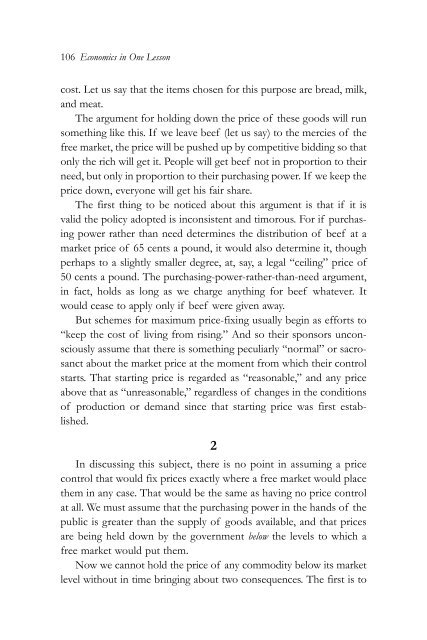1gDdM7w
1gDdM7w
1gDdM7w
- No tags were found...
You also want an ePaper? Increase the reach of your titles
YUMPU automatically turns print PDFs into web optimized ePapers that Google loves.
106 Economics in One Lessoncost. Let us say that the items chosen for this purpose are bread, milk,and meat.The argument for holding down the price of these goods will runsomething like this. If we leave beef (let us say) to the mercies of thefree market, the price will be pushed up by competitive bidding so thatonly the rich will get it. People will get beef not in proportion to theirneed, but only in proportion to their purchasing power. If we keep theprice down, everyone will get his fair share.The first thing to be noticed about this argument is that if it isvalid the policy adopted is inconsistent and timorous. For if purchasingpower rather than need determines the distribution of beef at amarket price of 65 cents a pound, it would also determine it, thoughperhaps to a slightly smaller degree, at, say, a legal “ceiling” price of50 cents a pound. The purchasing-power-rather-than-need argument,in fact, holds as long as we charge anything for beef whatever. Itwould cease to apply only if beef were given away.But schemes for maximum price-fixing usually begin as efforts to“keep the cost of living from rising.” And so their sponsors unconsciouslyassume that there is something peculiarly “normal” or sacrosanctabout the market price at the moment from which their controlstarts. That starting price is regarded as “reasonable,” and any priceabove that as “unreasonable,” regardless of changes in the conditionsof production or demand since that starting price was first established.2In discussing this subject, there is no point in assuming a pricecontrol that would fix prices exactly where a free market would placethem in any case. That would be the same as having no price controlat all. We must assume that the purchasing power in the hands of thepublic is greater than the supply of goods available, and that pricesare being held down by the government below the levels to which afree market would put them.Now we cannot hold the price of any commodity below its marketlevel without in time bringing about two consequences. The first is to


